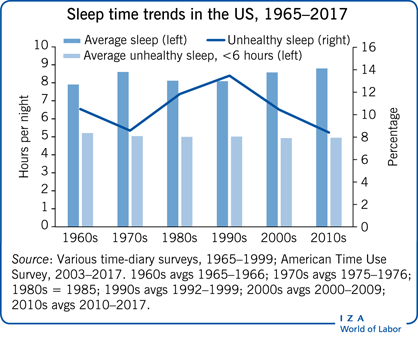Elevator pitch
Spending time sleeping not only improves individuals’ well-being, but it can influence employment outcomes and productivity. Sleep can be disrupted by company schedules and deadlines, extended working times, and several individual and household decisions. Labor market regulation and corporate strategies should factor in the immediate effect of insufficient sleep on employee fatigue and cognitive performance, and the associated effects on employment disruption and productivity loss. Sleep can be influenced by “sleep friendly” employment regulations, technology nudges, monetary incentives, and subsidies for sleeping.

Key findings
Pros
Variable sleep can explain employment fatigue.
Sleep deprivation can increase the probability of human error.
Reduced sleep time has been shown to directly influence employment outcomes, productivity, and working times.
Sleep deprivation gives rise to health effects such as burnout and anxiety, which have additional secondary economic consequences.
Behavioral interventions such as bedtime reminders and monetary incentives can help generate more “productive” sleep.
Cons
Individual sleep reports contain errors in how to measure sleep time and sleep quality, and especially in self-reported fatigue.
Time diaries might increase the precision of sleep measures but do not measure sleep quality.
Sleep time can be influenced by unforeseeable disruptions such as night temperature and sudden household events (e.g. children waking).
The short- and long-term effects of reduced sleep on health and other outcomes are often not factored in when sacrificing sleep quality to attain immediate goals.
Company-sponsored wellness programs do not always seriously prioritize sleep as a potential influence on employee productivity.